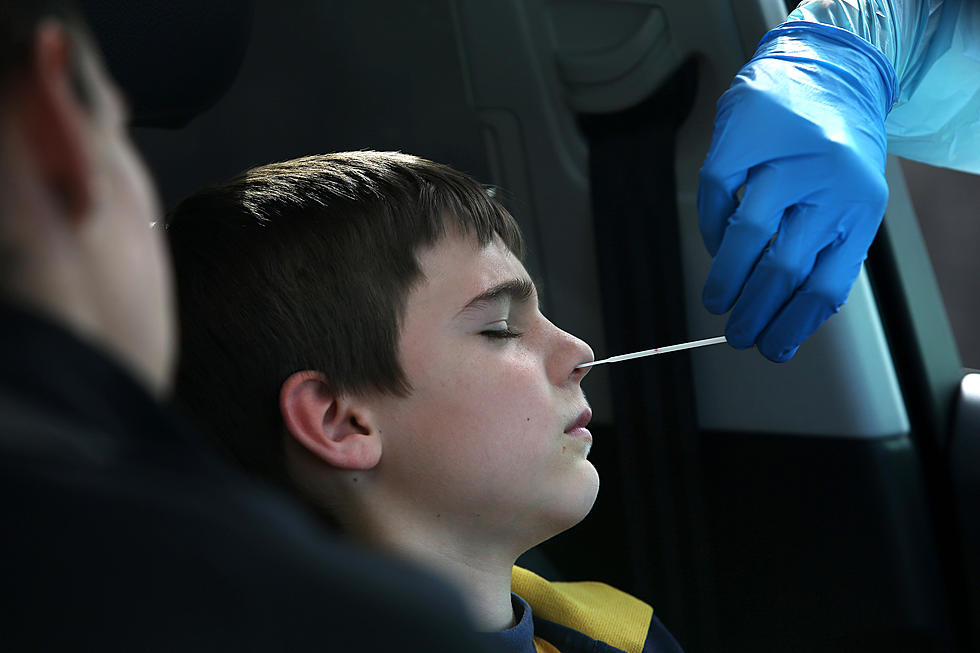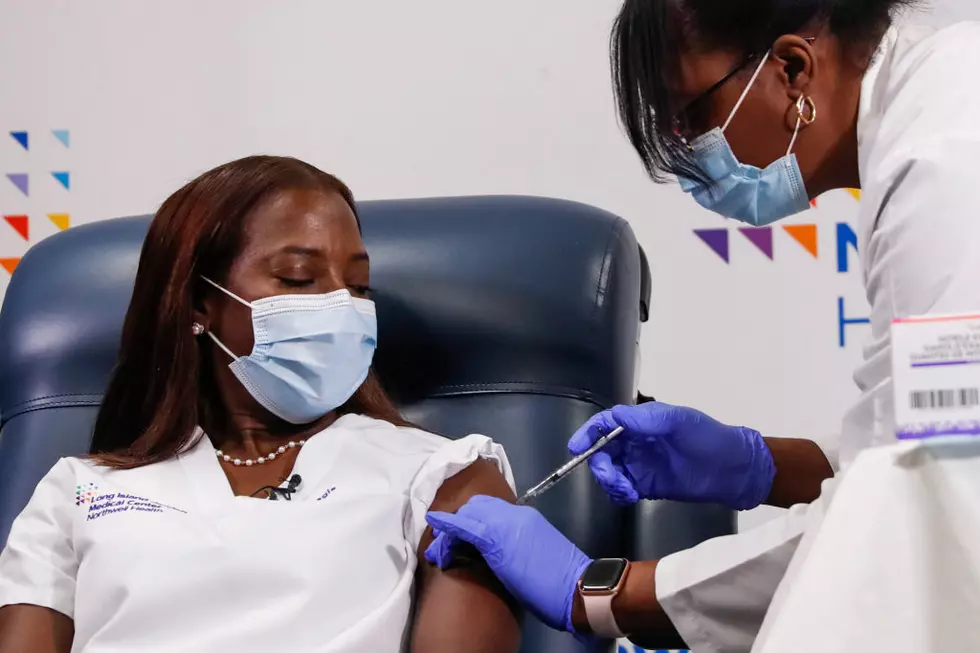
New COVID-19 Rules For New York Daycare, Child Camps
New York officials released a number of new guidelines for daycare and camps, including children wearing masks.

Enter your number to get our free mobile app
Physical Distancing
- Any time that employees are less than 6 ft. from each other or interacting with children/campers, they must wear a face covering.
- Ensure employee and children/camper groupings are as static as possible by having the same group of children/campers stay with the same staff whenever and wherever possible. Group size must be limited to no more than 10 children/campers (not including employees/staff).
- Ensure that different stable groups of up to 10 children/ campers have no or minimal contact with one another or utilize common spaces at the same time, to the greatest extent possible.
- Implement practices to maintain adequate social distancing in small areas, such as restrooms and breakrooms, and signage and systems (e.g. flagging when occupied) to restrict occupancy when social distancing cannot be maintained in such areas.
- Take reasonable steps to reconfigure space to limit overall density of rooms to 10 or fewer children/ campers.
- Prohibit non-essential visitors on site, to the extent possible. Establish designated areas for pick-ups and deliveries, limiting contact to the extent possible.
- Limit in-person gatherings of employees (e.g. breaks, meetings) to the greatest extent possible.
Protective Equipment
- Ensure employees wear face coverings any time they are 6 ft. apart from one another, and at all times when interacting with children/campers, regardless of distance.
- Provide employees with an acceptable face covering at no-cost to the employees and have an adequate supply of coverings in case of need for replacement.
- Acceptable face coverings include but are not limited to cloth (e.g. homemade sewn, quick cut, bandana) or surgical masks.
- Clean, replace, and prohibit sharing of face coverings.
- Consult the CDC guidance for additional information on cloth face coverings and other types of personal protective equipment (PPE), as well as instructions on use and cleaning and disinfection. Train employees on how to put on, take off, clean (as applicable), and discard PPE.
- Limit the sharing of objects (e.g. electronic equipment, arts and crafts materials, touch screens) and discourage touching of shared surfaces; or, when in contact with shared objects or frequently touched areas, require employees to wear gloves (trade-appropriate or medical); or, require employees and children/campers to practice hand hygiene before and after contact.
Child Care Program and Camp Activities
- For pool and aquatic activities:
- Ensure face coverings are not worn while in the water;
- Keep stable groups of children/campers separated;
- Encourage water activities where staff can safely supervise older children/campers in the water without being in the water by themselves.
- Ensure appropriate social distancing is kept, to the extent possible;
- Enhance cleaning and disinfection protocols
- For sport and athletic activities:
- Keep stable group of children/campers separated;
- Focus on activities with little or no physical contact (e.g. hiking, running);
- Encourage sports that involve less physical closeness over those that are close-contactor involve shared equipment;
- Encourage activities that are lower risk such as skill-building and conditioning;
- Enhance cleaning and disinfection protocols;
- For food services:
- Serve individual portions to children/ campers;
- Keep stable groups of children/campers separated;
- Stagger mealtimes to reduce occupancy/ congregation;
- Separate tables with seating at least 6 ft. apart from other tables, as feasible.
- Discourage excursions away from programs (e.g. field trips). If transportation occurs, make all reasonable efforts to maintain stable groups of children in vehicles.
- If groups of children must be mixed within a vehicle, seating must be arranged to maximize distance between different groups of children/campers and employees.
- All individuals (driver, employees, and children) over age 2 and able to medically tolerate a face covering must wear face coverings.
Hygiene, Cleaning, and Disinfection
- Adhere to hygiene, cleaning, and disinfection requirements from the Centers for Disease Control and Prevention (CDC) and Department of Health (DOH) and maintain logs on site that document date, time, and scope of cleaning and disinfection.
- Provide and maintain hand hygiene stations: handwashing with soap, running warm water, and disposable paper towels; alcohol-based hand sanitizer containing 60% or more alcohol for areas where handwashing is not available/practical.
- Make hand sanitizer available throughout common areas on site.
- Employees/staff and children/campers must perform hand hygiene immediately upon entering the program.
- Require staff and children to practice hygiene in the following instances:
- Upon arrival to the first program activity;
- Between all program activities;
- After using the restroom; • Before eating; and • Before departing the last program activity.
- Provide appropriate cleaning/disinfection supplies for shared and frequently touched surfaces (e.g. door handles, multi-seat strollers, toys, art supplies, areas where children eat), and encourage employees to use these supplies before/after use of these surfaces, followed by hand hygiene.
- Regularly clean and disinfect equipment and toys using the Department of Environmental Conservation’s (DEC) list of products identified by the Environmental Protection Agency (EPA) as effective against COVID-19.
- Limit children/campers from using toys that can’t be cleaned/sanitized (e.g. dress-up clothes, puppets).
- For programs with rest periods for children/campers, make individual clean bed coverings available for each child/camper, and do not allow bedding to be shared unless cleaned/disinfected.
- Take the following precautionary measures when taking care of young children:
- Frequent and thorough hand hygiene for both staff and children/campers.
- Whenever a child is soiled with secretions, change the child’s clothes and clean the child, as needed.
- When diapering/providing assistance with toileting, wear gloves, wash hands (staff and child), and follow cleaning and disinfection steps between each child.
Communication
- Affirm you have reviewed and understand the state-issued industry guidelines, and that you will implement them.
- Train all employees/staff on applicable precautions/ policies in the State’s guidance either remotely or inperson, using appropriate social distancing and requiring face coverings for all participants.
- Post signage inside and outside of the facility to remind individuals to adhere to proper hygiene, social distancing rules, appropriate use of PPE, and cleaning and disinfecting protocols.
- Conspicuously post completed summary safety plans on site
Screening
- Instruct staff to stay home if they are sick and remind parents/guardians to keep sick children/campers home.
- Implement mandatory health screening assessment (e.g. questionnaire, temperature check) for employees, visitors (e.g. contractors, vendors), and children/campers, either directly or through their parent/guardian.
- Screening must ask about (1) COVID-19 symptoms in past 14 days, (2) positive COVID-19 test in past 14 days, and/or (3) close or proximate contact with confirmed or suspected COVID-19 case in past 14 days. Responses must be reviewed and documented daily.
- For children/campers arriving to a program via bus transportation and for employees who provide supervision on the bus, screening must be completed prior to boarding the bus, where feasible.
- In the event that a parent/guardian of a child/camper must be isolated because they have tested positive for, or exhibited symptoms of, COVID-19, the parent/ guardian must be advised that they cannot enter the site for any reason, including picking up their child.
- If the parent/guardian – who is the a member of the same household as the child/camper – is exhibiting signs of COVID-19 or has been tested and is positive for the virus, utilize an emergency contact authorized by the parent to come pick up the child. As a “close contact,” the child/camper must not return to the child care or day camp for the duration of the quarantine.
- If the parent/guardian– who is the a member of the same household as the child/camper – is being quarantined as a precautionary measure, without symptoms or a positive test, staff should walk out or deliver the child/camper to the parent/guardian at the boundary of, or outside, the premises. As a “contact of a contact” the child/camper may return to the child care or day camp during the duration of the quarantine.
- If a child/camper or their household member becomes symptomatic for COVID-19 and/or tests positive, the child must quarantine and may not return or attend the child care or day camp program until after quarantine is complete.
- Immediately notify the state and local health department about any positive test result by an employee or child/camper at their site.
New Rules For NY Bars, Restaurants Tops This Week's Hudson Valley News
Hudson Valley's Top 10 News Stories of 2019
More From Hudson Valley Post









